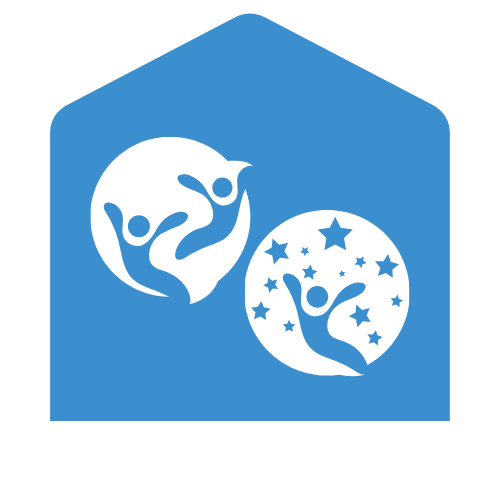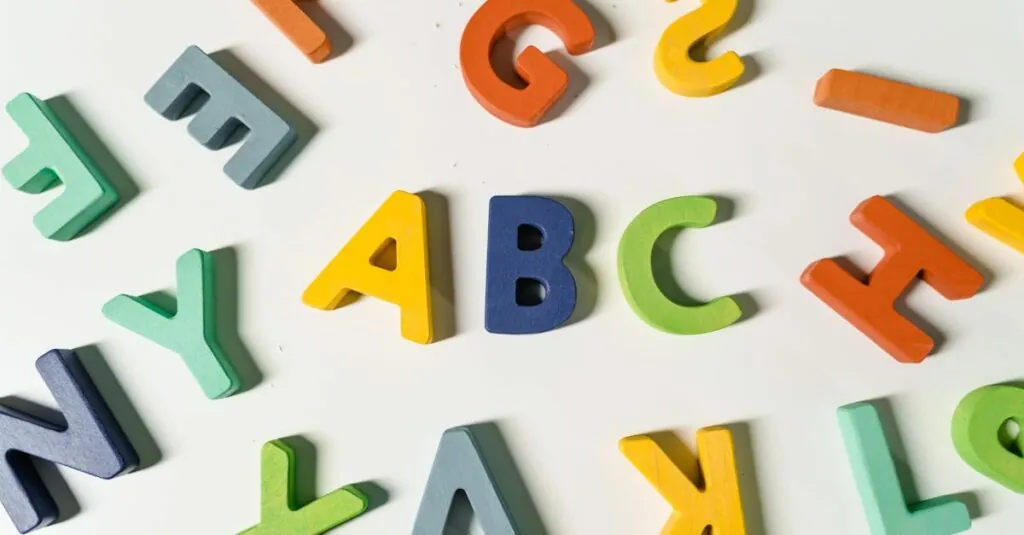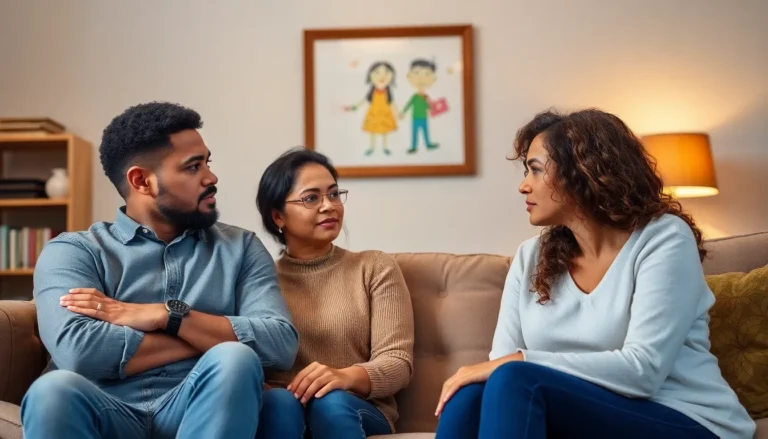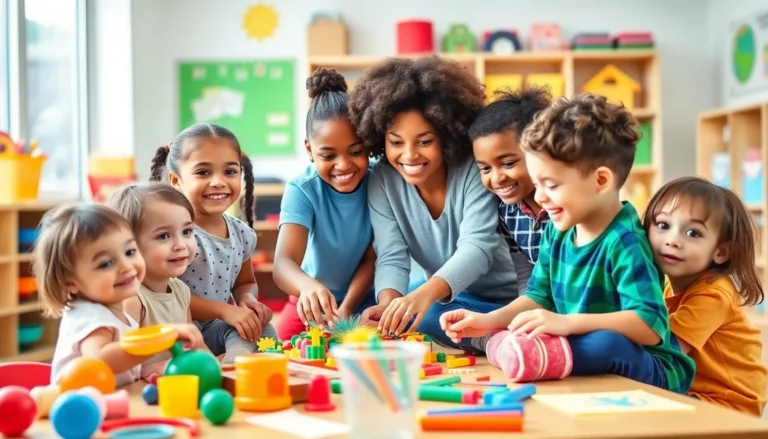Table of Contents
ToggleIn the bustling world of early childhood education, Ohio’s Early Learning Standards stand out like a well-placed rubber ducky in a sea of educational chaos. These guidelines aren’t just a set of rules; they’re a roadmap for nurturing young minds, ensuring kids are ready to tackle the world—one finger paint masterpiece at a time.
Overview of Ohio Early Learning Standards
Ohio Early Learning Standards serve as essential guidelines for early childhood education. These standards focus on holistic development through specific domains such as social-emotional, cognitive, and physical growth. Each domain outlines key indicators and competencies, providing a framework for educators to assess children’s progress.
Standards emphasize the importance of play as a critical element in learning. By engaging in interactive activities, children develop critical thinking and problem-solving skills. The guidelines encourage educators to create stimulating environments that foster curiosity and exploration.
Collaboration among families, educators, and communities enhances the implementation of these standards. Stakeholders must communicate effectively to support children’s growth. Regular training for educators ensures they remain informed about best practices in early childhood education.
Professional development opportunities also help educators understand children’s diverse needs. Knowledge of cultural and linguistic diversity strengthens the educational experience for all children. This inclusive approach promotes equitable access to quality learning experiences.
Monitoring and assessment play vital roles in tracking children’s progress. Educators utilize various assessment tools to measure growth and adapt teaching strategies accordingly. Regular feedback to families keeps them informed about their children’s developmental milestones.
Ohio Early Learning Standards create a structured approach to fostering young children’s development. By focusing on interaction, collaboration, and ongoing assessments, these guidelines support educators in preparing children for future academic success.
Importance of Ohio Early Learning Standards
Ohio Early Learning Standards play a crucial role in shaping early childhood education. These guidelines support holistic development, fostering essential skills in young children.
Benefits for Children
Children benefit from Ohio Early Learning Standards through structured learning experiences. Growth occurs across social-emotional, cognitive, and physical domains. Developmentally appropriate activities encourage critical thinking, creativity, and problem-solving. Engaging in play-based learning nurtures curiosity and confidence. Interactive learning environments enhance communication and collaboration skills. Assessment tools inform educators about each child’s progress, ensuring personalized learning strategies. Young learners receive support tailored to their unique needs, promoting a foundation for future academic success.
Benefits for Educators
Educators gain valuable insights from Ohio Early Learning Standards. These guidelines provide a comprehensive framework for assessing children’s development. Clarity in learning objectives enables teachers to create effective lesson plans. Professional development opportunities enhance educators’ skills, fostering confidence in implementing best practices. Collaboration with families and communities enhances educational experiences. Resources and training offered ensure educators stay informed about current strategies. Coordinated efforts lead to improved educational outcomes, benefiting both children and teaching professionals.
Key Components of Ohio Early Learning Standards
Ohio Early Learning Standards focus on essential developmental areas critical for young children’s growth. They provide a comprehensive framework for educators, guiding them in supporting holistic development through structured learning experiences.
Developmental Areas
The standards encompass several key developmental areas: social-emotional, cognitive, language and literacy, and physical development. Social-emotional skills foster interactions and relationships, helping children learn to express emotions. Cognitive development focuses on critical thinking and problem-solving abilities. Language and literacy skills are crucial for effective communication and understanding. Physical development emphasizes both gross and fine motor skills, enhancing children’s physical health and coordination.
Learning Progressions
Learning progressions detail the expected milestones for children from birth to age five. Each progression outlines specific skills educators should observe at different stages. These progressions inform teaching strategies, ensuring they are age-appropriate and effective. By tracking development through these progressions, educators can better assess individual strengths and areas requiring support. Utilizing this structured framework promotes a tailored approach, meeting each child’s unique needs while encouraging their growth and success.
Implementation Strategies for Educators
Educators play a crucial role in effectively implementing the Ohio Early Learning Standards. Specific strategies enhance their ability to support children’s development through these guidelines.
Best Practices
Utilizing developmentally appropriate practices creates engaging learning experiences for children. Focused observation helps educators assess progress while adapting instruction to meet children’s individual needs. Incorporating play-based learning encourages exploration and discovery, fostering critical thinking and creativity. Utilizing diverse teaching methods, including storytelling and hands-on activities, cultivates diverse skills. Collaborating with peers promotes knowledge sharing and the exchange of effective strategies for implementation. Establishing a consistent routine offers children security and enhances their readiness to learn.
Resources and Support
A variety of resources support educators in implementing the Ohio Early Learning Standards. Accessing online training modules and workshops strengthens educators’ understanding of the guidelines and best practices. State-sponsored professional development opportunities provide ongoing training tailored to evolving educational needs. Participation in local early childhood education networks fosters collaboration and information sharing among educators. Community partnerships offer additional resources, such as guest speakers and interactive events, enhancing educational experiences. Leveraging these tools equips educators to create enriching learning environments while maximizing children’s developmental outcomes.
Assessment and Evaluation
Assessment and evaluation play a critical role in the implementation of Ohio’s Early Learning Standards. These processes provide educators with essential insights into children’s developmental progress. Utilizing various assessment tools, teachers can gauge skills in multiple domains, including social-emotional, cognitive, language, and physical development.
Developmentally appropriate assessment methods ensure that evaluations reflect each child’s unique growth trajectory. Regular observations and documentation help educators identify areas where children excel and areas that might require further support. This information informs individualized learning strategies that align with specific needs.
Tracking developmental milestones, as outlined in the standards, allows for structured monitoring of progress from birth to age five. Educators can effectively observe whether children meet expected benchmarks, facilitating timely interventions when necessary. Tailoring instruction to nurture strengths fosters confidence and curiosity.
Engaging families in the assessment process strengthens the connection between home and school. Regular communication about children’s progress promotes shared goals and encourages parental involvement in learning. This partnership enhances children’s overall educational experiences.
Professional development opportunities enhance educators’ skills in assessment techniques. Training programs focused on observational skills and data interpretation equip teachers to implement effective assessment practices. Collaboration among educators also fosters the sharing of best practices for evaluating developmental outcomes.
Ultimately, a comprehensive assessment framework supports children’s growth and development, ensuring that they receive quality learning experiences. Ohio’s Early Learning Standards guide this process, providing a roadmap for evaluating and enhancing educational practices.
Ohio’s Early Learning Standards serve as a vital tool for educators aiming to support young children’s development. By focusing on holistic growth across key domains, these standards ensure that children are not only prepared for academic success but also equipped with essential life skills.
The emphasis on play-based learning and interactive environments fosters creativity and critical thinking, nurturing a love for learning that lasts a lifetime. With robust assessment strategies and collaborative efforts involving families, educators can create tailored experiences that truly meet each child’s needs.
Ultimately, Ohio’s commitment to early childhood education through these standards lays a strong foundation for future generations, promoting equitable access to quality learning experiences and enhancing developmental outcomes across the state.







